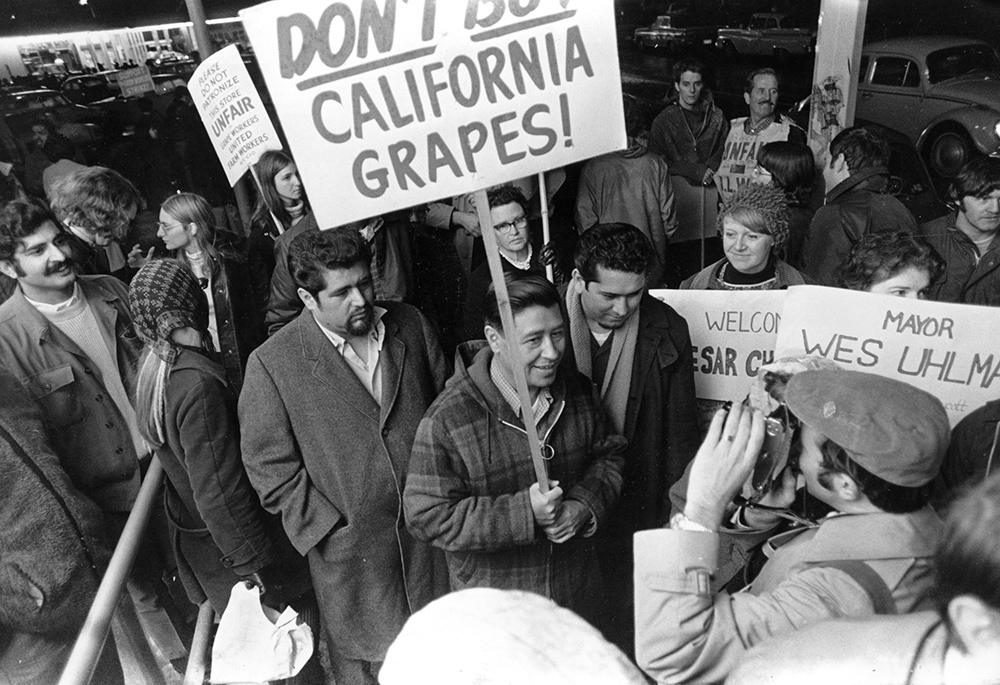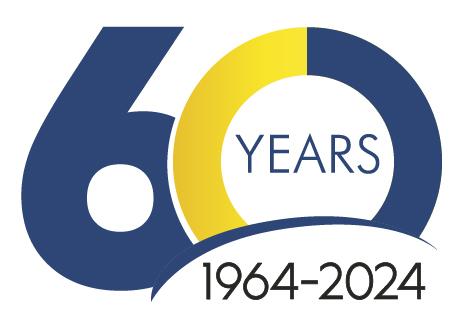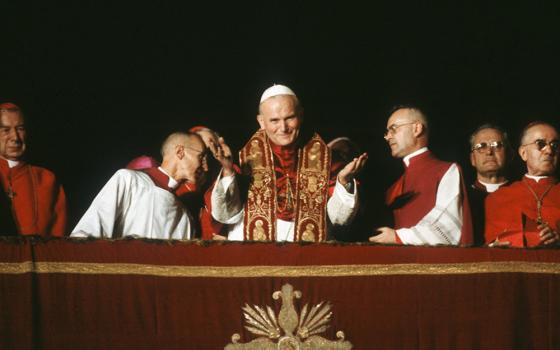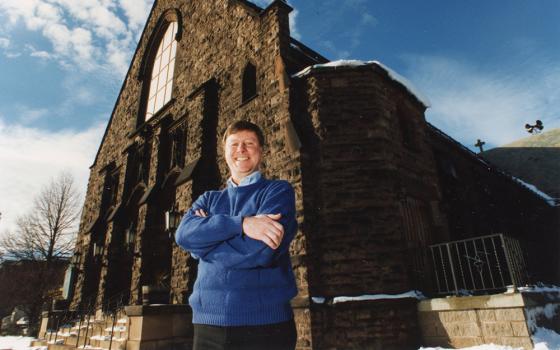
United Farm Workers President Cesar Chavez, carrying a sign calling for a boycott of California table grapes, leads about 400 people picketing a Safeway supermarket in Seattle, Washington, on Dec. 19, 1969. (AP photo/Barry Sweet)

(NCR logo/Toni-Ann Ortiz)
The past few months at NCR have been especially riveting. We've committed ourselves to covering how Catholics and the church are responding to the onslaught of cruelty and democratic dismantlement erupting from the second Trump administration.
A lot has happened in very little time, and as we perused our archives for this installment of our 60th anniversary feature, we couldn't help but be particularly struck by the story reprinted here. This headline from April 10, 1970, rings a bell, doesn't it?
Five Catholic prelates who helped secure table grape contracts during the legendary Delano grape boycott were labeled "misguided clerics" by the president of a corporate lobbying group. That thinly veiled contempt recalls Vice President JD Vance's rhetorical musing about the U.S. Conference of Catholic Bishops' "bottom line."
At the end of the day, even when enervated by a largely timorous or compromised hierarchy, Catholic social teaching has a way of being inconvenient for people whose actions fail to serve the common good.
May the church's witness moving forward resemble that reported below.
Bishops aid in grape pact; Called 'misguided clerics'
April 10, 1970
By Don Jardin
LOS ANGELES — Catholic bishops took an unprecedented role in bringing two grape growers and Cesar Chavez's AFL-CIO United Farm Workers Organizing committee to a farm labor settlement last week.
The contracts were signed at a news conference in the Los Angeles archdiocesan education offices, where Bishop Joseph F. Donnelly of Hartford, Conn., said he and a committee of fellow bishops were "confident that this breakthrough will serve as a pattern for others who wish to help solve this prolonged dispute."
But Allan Grant, president of the Farm Bureau federation, said the majority of California growers do not regard the contract signing as a breakthrough.
"Most growers are not willing to be coerced into signing unwanted contracts under pressure from either giant labor unions or misguided clerics," said Grant in northern California.
Charles and David Freedman, owners of three companies which control 7,800 acres of table grapes (less than 1 per cent of the table grapes grown in California), signed union shop contracts which include a 10 percent raise from $1.65 to $1.75 an hour and from 15 cents to 25 cents a box.
The Freedmans are growers in the Coachella valley, whose best known city is Palm Springs. Much of the growers' resistance — and strike activity — has been centered in the larger San Joaquin valley in central California.
Over the four-and-a-half strike period the UFWOC has signed about a dozen contracts with wine grape growers, but has been stymied in attempts to reach agreements with table grape growers — leading to the nationwide boycott of table grapes.
Bishop Donnelly headed a committee that included Archbishop Timothy Manning of Los Angeles, Bishop Hugh Donohoe of Fresno, Bishop Walter Curtis of Bridgeport, Conn., and Bishop Humberto Medeiros of Brownsville, Texas.
Beginning in early February, the bishops met with growers and union representatives and eventually toured California for talks with workers in the field and with 40 growers.
Advertisement
Bishop Donnelly, chairman of the Connecticut state board of mediation and arbitration for 20 years before becoming bishop five years ago, played a key role In bringing the principals of last week's agreement together in talks that began March 25 and ended at 3 a.m. on March 31.
Archbishop Manning, who was bishop of Fresno before returning to Los Angeles, said he hoped the signing would be “but the beginning of a chain of such contracts, so that prosperity and peace can once more descend into our fields and our homes."
Farm Bureau president Grant, in his day-after statement, asserted most growers would “continue to work for fair farm labor legislation, such as the (Senator George) Murphy bill, to provide opportunity for the workers to express themselves by secret ballot rather than forcing them to become union members through contracts such as those signed today."
The farm union has opposed the bill sponsored by the Republican senator, which would forbid strikes at harvest time.
Chavez, who appeared at the Los Angeles news conference, and William Kircher, AFL-CIO director of organizing, said the table grape boycott would not be ended.
Kircher said the boycott operations now would include promotion of the union label grapes, "which will be clearly marked on all boxes."
In Delano, Father Mark Day, a union spokesman, said that in addition to the 10-cent-an-hour wage increase, added fringe benefits would bring the workers' return from $1.65 to $2 an hour.
To read more about the early years of NCR, see the recently published National Catholic Reporter: Beacon of Justice, Community and Hope. You can learn more about the book at NCRonline.org/ncrbook, which includes links to outlets where you can buy the book in hardcover, paperback or e-book editions.







